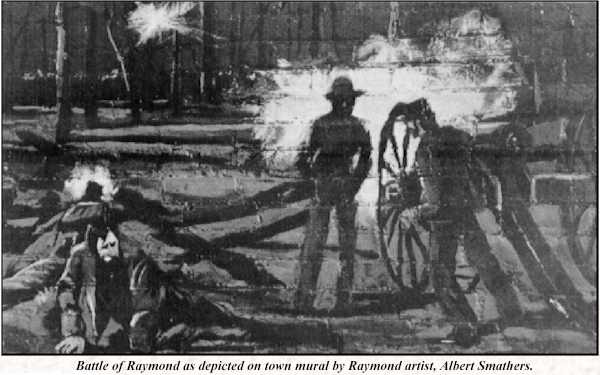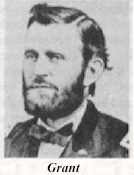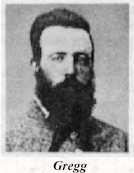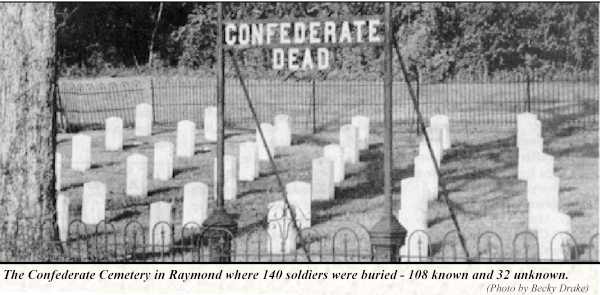| A Kaleidoscope of History The Battle of Raymond
General Ulysses S. Grant's orders to General McPherson as mailed from the Cayuga Post Office May 11 th, 1863 at 1:00 in the afternoon read: "Move your command tonight to the next cross roads, if there is water, and tomorrow, with all activity to Raymond. We must fight the enemy before our rations fail, and we are equally bound to make our rations last as long as possible. Sherman is now moving out on the Auburn and Raymond road, and will reach Fourteen Mile creek tonight. When you arrive in Raymond, he will be in close supporting distance. I will either see you myself tomorrow at Raymond or send you further instructions to that place." (Mississippi Dept. of Archives and History, from the record of the WAR OF REBELLION.) The War between the States had been raging thru the south since 1861 but citizens of Raymond never dreamed that it would soon lead to the most dramatic moment in the history of their town. The Battle of Raymond, May 12, 1863, was recorded by a town citizen as being the "saddest day Raymond ever witnessed." Had Raymond not been directly in the path of Grant's march toward the north - to get between the defenders of Vicksburg and the Confederates of Jackson - the battle would have never taken place.
Grant, frustrated because of his unsuccessful attempt to capture Vicksburg from the Mississippi River side, decided to try another plan of action. While his warships continued their active fight against Vicksburg he managed to transport thousands of Union soldiers across the Mississippi River to a landing at Bruinsburg, near Port Gibson. Instead of marching to Vicksburg, he unexpectedly cut himself away from the main supply base and began to march toward Jackson. His men were given a three day ration of hard tack, coffee and salt. Any other supplies had to be stolen from plantations or homes that lay in the path of the march. The night of May 11 th, Confederate General John Gregg and his small army of 2,500 men were camped in the woods near Raymond. Confederate General Pemberton had warned Gregg to look for a Federal feint in the Raymond area - but - predicted that the Union's main storm of attack would come at the Big Black River. Pemberton had failed to make "even elementary arrangements for scouting the Federal movements and failed to realize that Grant was marching hard not for the Big Black River but for Jackson." McPherson's 10,000 man XVII Corps was in the lead and Gregg's understrength brigade was directly in its path. Early on the morning of May 12 the armies made contact. The opposing forces were separated by a small stream of water called Fourteen-Mile Creek. General Gregg, assuming McPherson's vanguard was a small unit, ordered his brigade to move forward and flank the enemy. This unexpected and aggressive attack by the Confederates drove the Union's 10,000 men in the open. General Gregg's small army did not have a chance against the massive Union army. In spite of the odds the battle raged until about 2 o'clock in the afternoon before General Gregg "leaped from the lion's mouth" and retreated with his troops toward Jackson. "It was a costly little victory. The Federals had lost 442 men. The Confederates toll was 514, with the 7th Texas and 3rd Tennessee accounting for 345 of those casualties." (WAR ON THE MISSISSIPPI, Grant's Vicksburg Campaign, Time Life Books).
Before midnight, May 12, all of the wounded soldiers were brought into town. The Confederates used the Court House and Oak Tree Hotel as hospitals, while the Yankees used the Baptist and Episcopal Churches, Masonic Hall, Female Institute and many private residences to house their wounded. General Grant made his headquarters at the home of Major Peyton. For at least two weeks the Yankees held possession of the town and surrounding countryside. During this time Yankee troops searched out George W. Harper's newspaper office and threw his printing presses in the town well. They also burned all of his files. In the History of Raymond by Mrs. H.C. Gillespie, a story is told about a valuable lock box that was the property of John Shelton. "The lock box was stolen by some of the Federal troops. As they unlocked the box and began to distribute the contents among themselves, it was taken from them by their commanding officer, Col. Mudd of Missouri. Shortly after the war, the widow of Col. Mudd found the lock box and returned it to Mr. Shelton with all contents intact. Mr. Shelton was so moved that he wrote Mrs. Mudd a letter commending the honorable and just behavior of her husband." After the Battle of Raymond and another victory for the Union soldiers, General Sherman and General McPherson marched on toward Jackson. The seige and burning of Jackson ultimately put a "seal of defeat" on the south. Approximately two months later, July 4th 1863, Vicksburg surrendered and the south admitted defeat. Ulysses S. Grant - "Unconditional Surrender Grant" - had won the war. Immediately Grant became a national hero and was commended for all of the brilliant battles that he had won. Unfortunately, the one battle in life that Grant did not win was the last one he had to fight - the battle against cancer which ultimately ended his life.
Historical notes from: War on the Mississippi, Time-Life Series, History of Raymond, Mrs. H. B. Gillespie, Sr., Clarion Ledger article "Gay Time and Sad Times, Raymond" by Ralph Hutto. © 1998-2005, all rights reserved |



